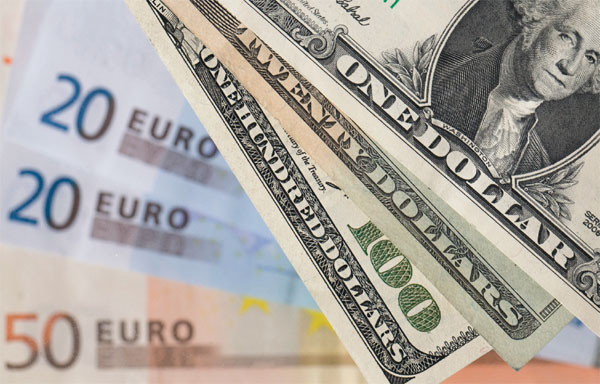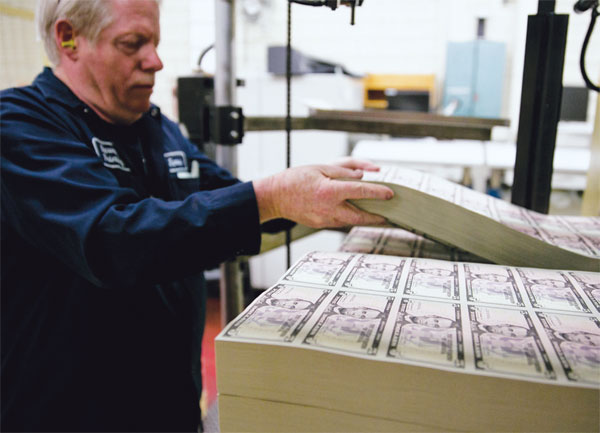2015 forex market risky, warns expert
Updated: 2015-03-14 08:02
By Emma Dai in Hong Kong(HK Edition)
|
|||||||||
|
The US dollar is seen to have strengthened to a record high, but the US Fed is cautious over further tightening measures, while the European quantitative easing program will continue to slash the value of the euro, with the Greek debt crisis hanging over the European financial market like the Sword of Damocles. Chris Ratcliffe / Bloomberg |
Volatility is the key word for the foreign exchange market this year, given monetary policy divergence among global central banks and the evolving situation in the eurozone, said a currency specialist at Bank of America (BOA) Merrill Lynch.
"The US dollar is no longer undervalued - it may have already become too strong. But looking forward, the dollar is still rising against all Asian currencies. So short-term downside risk, if there is any, will offer an opportunity to buy," Athanasios Vamvakidis, head of European G10 foreign exchange strategy of the bank, told China Daily.
Vamvakidis predicted that the US Federal Reserve will be "cautious" about hiking bank interest rates.

Instead of June, as many traders had expected, the Fed may not make a move until September, and then raise the benchmark rate every other meeting. This would be in line with market expectations, he said, adding that BOA expects the euro to strengthen to $1.1 by yearend from $1.05.
Since the middle of last year, the Fed's monetary tightening stance has helped push up the dollar's exchange rate against most major currencies.
The US Dollar Index, which measures the greenback against a basket of other major currencies, has risen 9.6 percent in the past three months hitting a 12-year-high at 100.06 on Wednesday. The euro fell to $1.0547 on Wednesday, the lowest against dollar since April 2003.
But the dollar "might not go straight up", Vamvakidis noted. "A key theme this year is the incremental increases of foreign exchange volatility, partly due to monetary policy divergence," he said.
While the Fed is getting hawkish, the European Central Bank (ECB) is heading the other way by implementing its quantitative easing (QE) program this Monday. Under the program, ECB is committed to purchasing 60 billion euro ($63.7 billion) in assets every month from both the government and private sector until September 2016 - injecting a total of 1.1 trillion euro into the money market.
The decision is aimed at revitalizing the eurozone economy and lifting it out of years of stagnation. Early in March, the ECB raised its GDP growth forecast to 1.5 percent for 2015 and 1.9 percent for 2016. It has also raised 2016 inflation forecast to 1.5 percent and 1.8 percent for 2017.
"The bond-purchasing program is very strong," Vamvakidis said. Although the demand projections may look "too optimistic", it suggests the ECB is not going to stop QE in a hasty manner, he added.
"It is important that the QE is open-ended, meaning that the central bank will keep purchasing bonds until economic data become good enough," Vamvakidis said. This represents a sharp departure from past practice, he said, explaining that the ECB used to wait for things to get out of hand before acting. As such, it was always seen to be "lagging behind the game".
Meanwhile, the shifting methodology of other central banks - not just the ECB - has also caused greater uncertainties in the foreign exchange market. "We are entering a new regime under which policies are data-dependent", Vamvakidis said. "Correlation with economic fundamentals is coming back, which, though leading to more ups and downs, is a good thing," he said.
Vamvakidis cautioned that the "Greek crisis" has remained a serious threat to the health of the eurozone. Greece, he said, is running out of cash and depending on liquidity support from ECB.

The Greek government would need to implement reforms in exchange for further funding from the ECB, without which it could be forced out of the eurozone, he said.
"It's politically difficult, because some of the measures demanded by creditors are against the government's pre-election promises," Vamvakidis said, adding that the reformative proposal would need parliamentary approvals and the approval of the European Union finance ministers.
However, he emphasized that the incentive agreed by both sides is to avoid a Greek default on its borrowings from ECB and IMF.
"The ECB has done the most they could have done with Greece. The QE program will stop deflation. And the weak euro, combined with relatively low oil prices, is supportive, especially to the European peripheral countries. But it's still a question whether the eurozone can meet the 2-percent inflation target in the medium term. We have to wait and see," he said.
emmadai@chinadailyhk.com
|
Central banks around the world stay tuned as a possible shift in US Fed's interest rate decisions will inject tremendous uncertainties into the international financial market. Andrew Harrer / Bloomberg |
(HK Edition 03/14/2015 page10)

